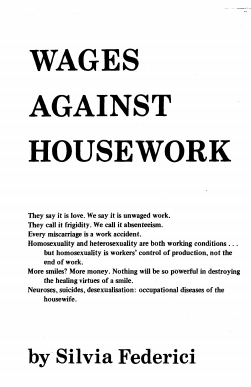You are currently browsing the monthly archive for May 2013.
Silvia Federici is one of the most important political theorists alive today. Her landmark book Caliban and the Witch demonstrated the inextricable link between anti-capitalism and radical feminist politics by digging deep into the actual history of capital’s centuries-long attack on women and the body.
In this essay, originally written in 2008, she follows up on that revelation by laying out her feminist anti-capitalist vision, and how it extends beyond traditional Marxism. This piece is comprehensive – long but far-reaching. At times seeing the truth requires seeing in the dark – acknowledging the true horrors of the world as it currently is manifest.
This essay was updated and published in Silvia’s new anthology Revolution at Point Zero, and I have made a few small additional edits. Enjoy! [alex]
The Reproduction of Labor Power in the Global Economy and the Unfinished Feminist Revolution (2011 edition)
 “Women’s work and women’s labor are buried deeply in the heart of the capitalist social and economic structure.” – David Staples, No Place Like Home (2006)
“Women’s work and women’s labor are buried deeply in the heart of the capitalist social and economic structure.” – David Staples, No Place Like Home (2006)
“It is clear that capitalism has led to the super-exploitation of women. This would not offer much consolation if it had only meant heightened misery and oppression, but fortunately it has also provoked resistance. And capitalism has become aware that if it completely ignores or suppresses this resistance it might become more and more radical, eventually turning into a movement for self-reliance and perhaps even the nucleus of a new social order.” – Robert Biel, The New Imperialism (2000)
“The emerging liberative agent in the Third World is the unwaged force of women who are not yet disconnected from the life economy by their work. They serve life not commodity production. They are the hidden underpinning of the world economy and the wage equivalent of their life-serving work is estimated at $16 trillion.” – John McMurtry, The Cancer State of Capitalism (1999)
“The pestle has snapped because of so much pounding. Tomorrow I will go home. Until tomorrow Until tomorrow… Because of so much pounding, tomorrow I will go home.” – Hausa women’s song from Nigeria
INTRODUCTION
 This essay is a political reading of the restructuring of the (re)production of labor-power in the global economy, but it is also a feminist critique of Marx that, in different ways, has been developing since the 1970s. This critique was first articulated by activists in the Campaign for Wages For Housework, especially Mariarosa Dalla Costa, Selma James, Leopoldina Fortunati, among others, and later by Ariel Salleh in Australia and the feminists of the Bielefeld school, Maria Mies, Claudia Von Werlhof, Veronica Benholdt-Thomsen.
This essay is a political reading of the restructuring of the (re)production of labor-power in the global economy, but it is also a feminist critique of Marx that, in different ways, has been developing since the 1970s. This critique was first articulated by activists in the Campaign for Wages For Housework, especially Mariarosa Dalla Costa, Selma James, Leopoldina Fortunati, among others, and later by Ariel Salleh in Australia and the feminists of the Bielefeld school, Maria Mies, Claudia Von Werlhof, Veronica Benholdt-Thomsen.
At the center of this critique is the argument that Marx’s analysis of capitalism has been hampered by his inability to conceive of value-producing work other than in the form of commodity production and his consequent blindness to the significance of women’s unpaid reproductive work in the process of capitalist accumulation. Ignoring this work has limited Marx’s understanding of the true extent of the capitalist exploitation of labor and the function of the wage in the creation of divisions within the working class, starting with the relation between women and men.
Had Marx recognized that capitalism must rely on both an immense amount of unpaid domestic labor for the reproduction of the workforce, and the devaluation of these reproductive activities in order to cut the cost of labor power, he may have been less inclined to consider capitalist development as inevitable and progressive.
As for us, a century and a half after the publication of Capital, we must challenge the assumption of the necessity and progressivity of capitalism for at least three reasons.




Recent Comments